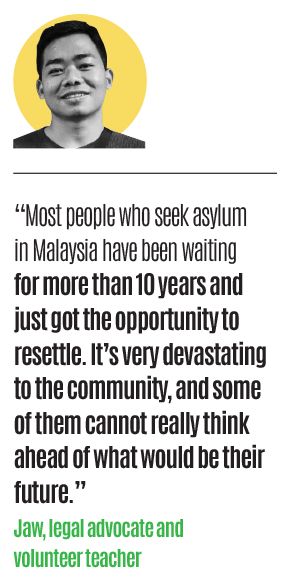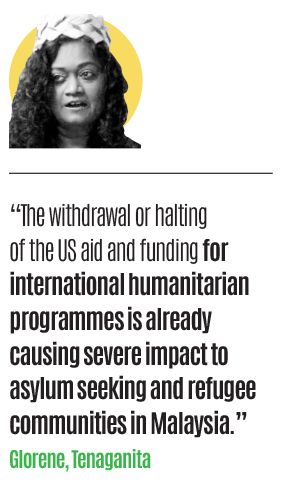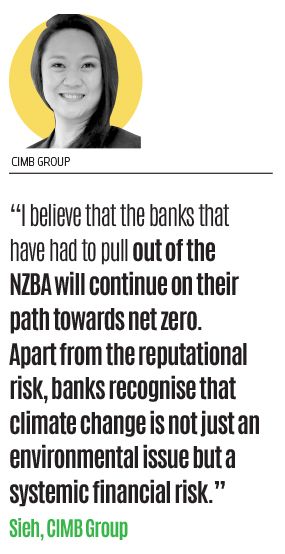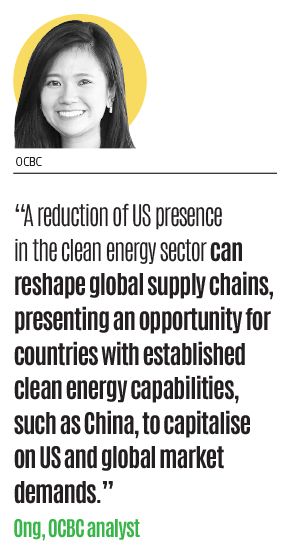
This article first appeared in The Edge Malaysia Weekly on February 17, 2025 - February 23, 2025
One of US President Donald Trump’s first actions when he took office last month was to cut the US resettlement programme for refugees and freeze funding for foreign aid.
These actions have had ripple effects throughout the world and in Malaysia, where many refugees are awaiting resettlement to the US.
Even the refugees who have received confirmation on resettlement have had to change their plans, leaving their future in limbo.
“One of our chefs was actually scheduled to be resettled just a week after the announcement. She had already closed her kitchen and made all the necessary preparations to leave. Another chef, who was also on standby for resettlement, had sold off all her kitchen equipment in anticipation of starting a new life,” says Marshyani Vijaya Kumar, community lead at PichaEats, a Malaysian catering company that works with chefs from the refugee community.
“Imagine waiting almost 10 years for that one call, believing your future was finally secured, only to have it taken away at the very last moment.”
Since Malaysia is not a signatory to the 1951 Refugee Convention and 1967 Protocol Relating to the Status of Refugees, it does not accept refugees or asylum seekers for resettlement, nor are they able to work or go to school formally in the country.
Refugees and asylum seekers who enter Malaysia are registered by the United Nations High Commissioner for Refugees (UNHCR) and wait for resettlement in a third country. The US has the largest resettlement programme in the world.
“Most people who seek asylum in Malaysia have been waiting for more than 10 years and just got the opportunity to resettle. It’s very devastating to the community, and some of them cannot really think ahead of what would be their future,” says Jaw Hpaude, a legal advocate and volunteer teacher at a Kachin refugee learning centre in Malaysia. The Kachin, from Myanmar, are one of the country’s largest Christian minorities and face persecution and oppression from the Myanmar military.
“Because of this situation, I think refugees will become more vulnerable. I’m also working with a local non-governmental organisation (NGO), and I’m seeing there is a high risk of arrest and detention of undocumented asylum seekers and alleged extortions by some local authorities.”
The funding cut for foreign aid will impact the UNHCR’s capacity to resettle refugees. Already, the registration process takes around three or more years, says Jaw. In the meantime, the refugees have to find work informally to support themselves.
“What happened is that some people are exploited at their workplace because they don’t have the right to work formally , but they’re trying to survive and put food on the table for their families and have a roof over their head … This can also push them to become victims of human trafficking,” says Jaw.
Additionally, he is concerned about their mental health. “These people come from war-torn zones of conflict-affected areas, and they already have this trauma. When they experience another trauma or this limbo situation, it will really affect their psychological well-being.”
This is also noted by Glorene Das, executive director of Tenaganita, a human rights non-profit organisation in Malaysia.
“The withdrawal or halting of US aid and funding for international humanitarian programmes is already causing severe impact to asylum seeking and refugee communities in Malaysia. Many refugee-led initiatives rely on external support for critical services such as education for children, livelihood programmes for women, protection interventions against sexual and gender-based violence, health services and mental health support,” says Glorene.
“Without this support, refugee communities may face increased vulnerability to trafficking, forced labour and other forms of exploitation and xenophobia as well.”
What can be done? The main suggestion of the interviewees is to grant refugees the right to work legally, thus extricating them from exploitative and unprotected work conditions.
“The fact is, they’re already here, equipped with skills and a strong drive to contribute. All they need is a fair chance,” says Marshyani.
Jaw also hopes for legal frameworks to protect refugee communities in Malaysia, which would give them basic rights. Malaysia, as the chair of Asean, should advocate for a regional policy or framework to address the refugee crisis collectively, he adds.
“In the long term, they definitely should pressure the military junta in Burma (Myanmar) and shouldn’t collaborate (with them). The political instability and ongoing civil war in Myanmar have negatively impacted the entire region.”
The public can play a role by advocating for inclusive policies and supporting organisations that are providing direct assistance to the refugees, adds Glorene.
Less focus on ESG and climate change
While the US has never been seen as a leader in the climate movement, the country’s decision to pull out of the Paris Agreement will have negative implications. Among other things, as one of the world’s biggest emitters of greenhouse gas emissions, the lack of action from the US will exacerbate the climate crisis.
“If you look at historical emissions, the US has already consumed one fifth of the carbon budget to limit temperature rise within the Paris Agreement,” says Meenakshi Raman, president of Sahabat Alam Malaysia.
“For a country like the US to leave and to expect the emissions gap to be met by the rest of the world is really unfair to developing countries.”
Secondly, it could prompt other countries to follow in its footsteps. Indonesia’s special envoy for climate change and energy Hashim Djojohadikusumo, for instance, has been quoted as saying the country is considering withdrawing from the Paris Agreement, as it is unfair for developing countries to comply with the agreement if a major polluter like the US is not part of it.
Meenakshi’s hope is that the countries that remain in the Paris Agreement will go ahead with climate mitigation and adaptation efforts.
“All of us are suffering. We cannot deny climate science. It took us so long and a lot of effort to get the Paris Agreement. It was such a hard battle, and even with the little that we get out of it, it’s still the only regime that can hold governments accountable,” she says.
Trump’s anti-ESG stance and his belief that climate change is a hoax are also putting pressure on the private sector to halt any initiatives related to climate change.
Notably, six big US banks, including JPMorgan, Goldman Sachs and Citigroup, have exited the United Nations Net-Zero Banking Alliance (NZBA), which has been a driving force for the adoption of sustainability initiatives by financial institutions.
Despite this, Luanne Sieh, head of group sustainability at CIMB Group Bhd, remains optimistic that companies and regulators that recognise the longer-term opportunities and risks of climate change will continue to push this agenda.
“I believe that the banks that have had to pull out of the NZBA will continue on their path towards net zero. Apart from the reputational risk, banks recognise that climate change is not just an environmental issue but a systemic financial risk that threatens the stability of financial institutions, industries and economies,” she says.
“I think it is just a matter of time. Sooner or later, people and businesses will realise that climate action can no longer be put off, and at that point we would have even less time to decarbonise, potentially putting the global economy on a path of highly disorderly transition.”
Businesses that fail to transition in time will face the risk of stranded assets, she adds.
CIMB was the first Asean bank to join NZBA. Sieh says the bank remains an active member of the alliance and will continue to work with NZBA in this changing landscape, in collaboration with the industry and clients.
Nevertheless, a climate finance gap will have to be filled. Ong Shu Yi, ESG analyst at OCBC, observes that the lack of climate finance from the US to developing countries — like the funding it provides to Indonesia to phase out coal power plants — could slow down the implementation of energy transition projects.
Ong believes, however, that the strong momentum behind various decarbonisation initiatives in Southeast Asia, such as bilateral partnerships in areas like carbon credits and cross-border electricity trade, will continue. The US’ plans to boost fossil fuel production and roll back incentives for electric vehicles will also present opportunities for other regions.
“A reduction of US presence in the clean energy sector can reshape global supply chains, presenting an opportunity for countries with established clean energy capabilities, such as China, to capitalise on US and global market demands,” says Ong.
Climate change a real risk
The observation that climate change impacts will continue to occur and result in physical damage and loss of lives is highlighted by both Meenakshi and Sieh. With more inaction, these consequences will only become increasingly severe.
“Although businesses that continue to delay climate action may reap higher profits in the next few years, they could be putting themselves in a position of serious transition risks and will be at a disadvantage when people, businesses and governments inevitably realise that all must act swiftly and decisively to avert the worst effects of climate change that will destroy economic value and put livelihoods and societies in crisis,” says Sieh.
“On the flip side, far-sighted businesses that continue to invest in the huge opportunities that a low-carbon transition presents will emerge better prepared and more resilient in the medium to long term.”
In the meantime, countries such as Malaysia will have to focus more on adapting to these impacts, says Meenakshi. These include flooding and coastal erosion due to sea level rise.
“I do think we have to keep going forward, even though some countries are going backwards … It’s more important for the rest of the world to work together to go forward in the right direction, because otherwise, everybody will lose,” says Meenakshi.
Save by subscribing to us for your print and/or digital copy.
P/S: The Edge is also available on Apple's App Store and Android's Google Play.
- Malaysia refutes 47% US import tariff claim, takes measures to prioritise well-being of businesses and people
- Trump hits China tariff retaliation, says policy will remain
- China retaliation on US farm goods hits soybeans, bolstering Brazil
- Wall Street rout drags Nasdaq near bear market
- Axiata, Malaysia Smelting Corp, Lianson Fleet, Radium Development, Mr DIY, KKB, Ho Hup
- ‘Worst-case scenario’ for tech wipes $1.4 trillion from Nasdaq
- Anwar says impact of latest US tariff on nation's economy still being assessed
- Tok Mat, Rubio discuss bilateral relations, Asean-US Special Summit date
- US solar’s hoarding habit will help blunt sting from Trump tariffs
- Wall Street rout drags Nasdaq near bear market




